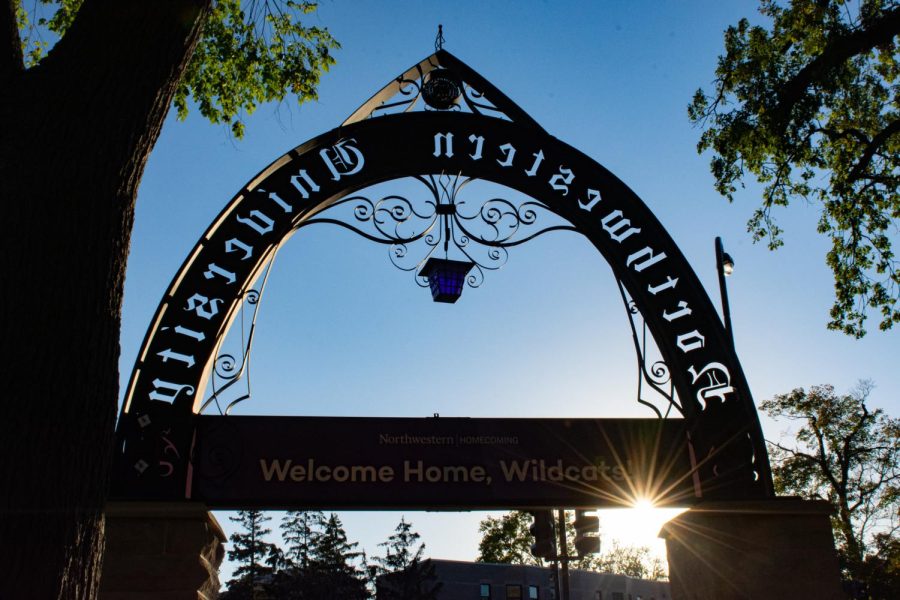As Northwestern admits 7% of applicants for its class of 2026, President Schapiro says he still reads application files
Daily file photo by Angeli Mittal
The Arch. Northwestern admitted 7% of its first-year applicants this year.
March 30, 2022
Amid ongoing litigation alleging Northwestern privileges wealthy applicants in the admissions process, NU accepted 7% of first-year applications, according to University spokesperson Hilary Hurd Anyaso.
The University received a total of 51,554 applications for the class of 2026 in the early and regular admissions cycles — up by almost 4,000 from last year.
Two NU alumni are among the plaintiffs in the lawsuit, which cites a 2019 Daily article in which President Morton Schapiro said he personally reads some applications, including from legacy students and applicants connected to wealthy donors.
In an interview with The Daily earlier this month, Schapiro said he has continued that practice, reading several hundred applications in the current cycle from “all kinds of people.” The files included those from Evanston Township High School and Chicago public high school students, as well as “a lot” of applicants who are siblings of NU students, he said.
“The ones who happen to be legacies are a very small percentage of the files that I have on my desk,” Schapiro added. “Do I read some legacies? Yes. Mostly they’re not legacies.”
Schaprio said he also reads applications from students recommended by recipients of NU’s Distinguished Secondary School Teacher Award, who are sometimes alumni of the University.
Among 16 U.S. universities named in the lawsuit, which was filed in January, NU is one of nine schools alleged to have considered applicants’ financial circumstances as a factor in admissions decisions. The lawsuit also claims NU and the other universities engaged in a “price-fixing cartel” to reduce or eliminate financial aid and artificially inflate the net price of attendance for financial aid recipients.
“(Schapiro) is using his discretion to make or influence numerous admissions decisions,” the lawsuit said.
Though he sometimes makes arguments for certain applicants, Schapiro said the University’s admissions staff ultimately decides whether to admit the student.
Schapiro, who was previously president of Williams College, also said he has read application files for “decades.”
“I have never in my 22 years as a president told anybody in admissions, ‘No, this kid has to get in,’” Schapiro said. “If it’s somebody I really believe in, I make my argument, but quite often they say no.”
This year’s acceptance rate has marginally increased from last year’s record low of 6.8%. NU also received 3,420 transfer applications, up from 2,855 last year, Anyaso said.
Schapiro said the number of applications he reads has not risen as the overall applicant pool has grown. In fact, he said he reviewed fewer than 500 applications in the current cycle, compared to as many as 600 in previous years.
An overall drop in acceptance rate, coupled with a rise in application quantity, has been a years-long trend for the University. The acceptance rate continually declined from 23.1% to 8.4% between 2010 and 2018. After increases in the 2019 and 2020 application cycles, the acceptance rate dropped steeply last year when the University received over 8,000 more applications than in 2020.
NU has also extended its test-optional admissions policy for the third year in a row, Anyaso said, though it has not determined whether the policy will be permanent. After the onset of the COVID-19 pandemic, the University announced applicants can choose whether to submit standardized test scores.
Admitted first-year students have until May 1 to accept or reject their admissions offer, Anyaso added.
Email: [email protected]
Twitter: @maiapandey
Related Stories:
— Northwestern’s acceptance rate falls to 6.8 percent, lowest in University history
— Northwestern among 16 universities sued for allegedly colluding to limit financial aid
— Northwestern President Schapiro says he reads applications of some legacy, donor students












